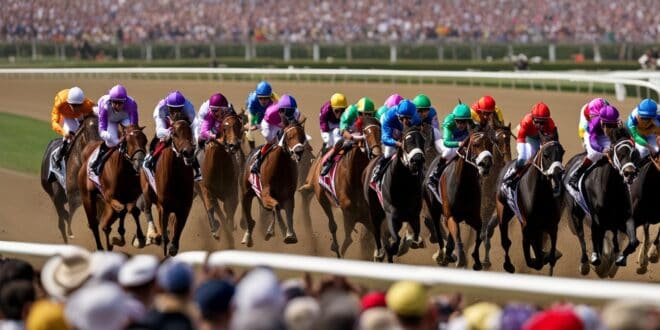Horse racing is a captivating sport that combines the exhilaration of competition with the thrill of betting. From ancient times to the modern era, horse racing has evolved into a multi-billion dollar industry that attracts millions of spectators and enthusiasts worldwide. Whether you’re a seasoned punter or a curious newcomer, understanding the ins and outs of horse racing is essential for both enjoyment and success.
Key Takeaways:
- Horse racing is a popular sport with a rich history and a significant betting component.
- There are different types of horse races, including flat racing, steeplechasing, harness racing, and endurance racing.
- The most common horse racing breeds include the Arabian, Thoroughbred, American Quarter Horse, Standardbred, and Paint Horse.
- Understanding the basics of horse betting, strategies, and bookmakers are crucial for successful horse racing betting.
- Live betting adds an exciting element to horse racing, allowing bettors to place wagers during the race.
A Brief History of Horse Racing
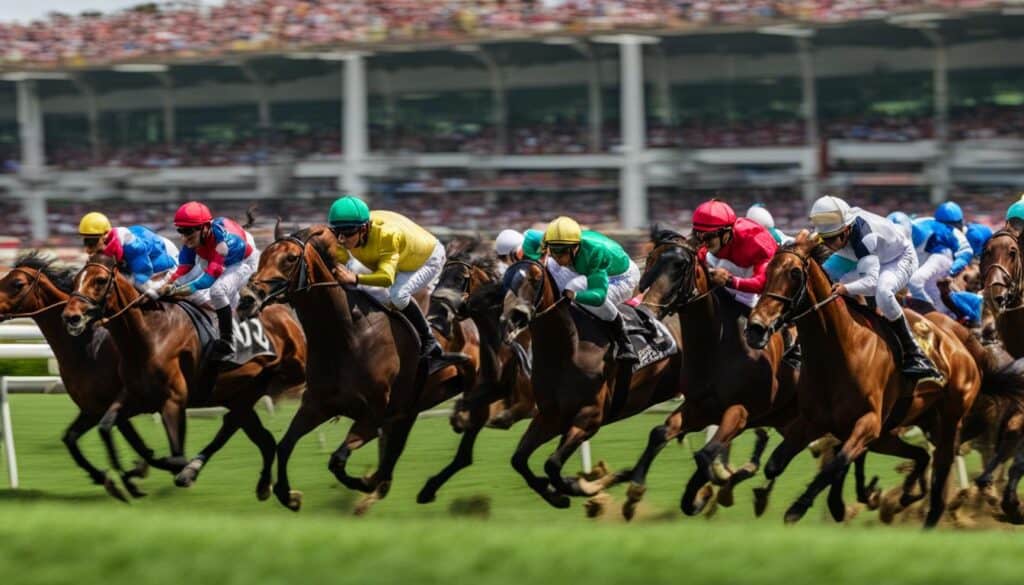
Horse racing has a rich and fascinating history that dates back to ancient times. The sport of horse racing can be traced back to ancient Greece, where the first recorded races took place. From there, horse racing spread to neighboring civilizations, capturing the imagination of people from various cultures.
During medieval times, horse racing gained popularity in England and became a prominent sport. It was during this period that rules and regulations were established to govern the races. King Charles II played a pivotal role in the development of horse racing in England, introducing prize money for races and establishing the prestigious King’s Plate races.
The modern era of horse racing began in the 1700s, marked by the establishment of iconic races that are still celebrated today. The St. Leger Stakes, founded in 1776, is one of the oldest and most prestigious races in the world. The Kentucky Derby, first held in 1875, is a prominent event in American horse racing, capturing the attention of millions.
Horse racing has evolved significantly over the centuries, capturing the hearts of enthusiasts and attracting widespread attention. Today, it continues to be a thrilling sport that showcases the remarkable athleticism and elegance of these magnificent animals.
As horse racing has evolved and adapted to the changing times, it remains a beloved sport that continues to captivate audiences around the world.
What Are the Different Types of Horse Races?
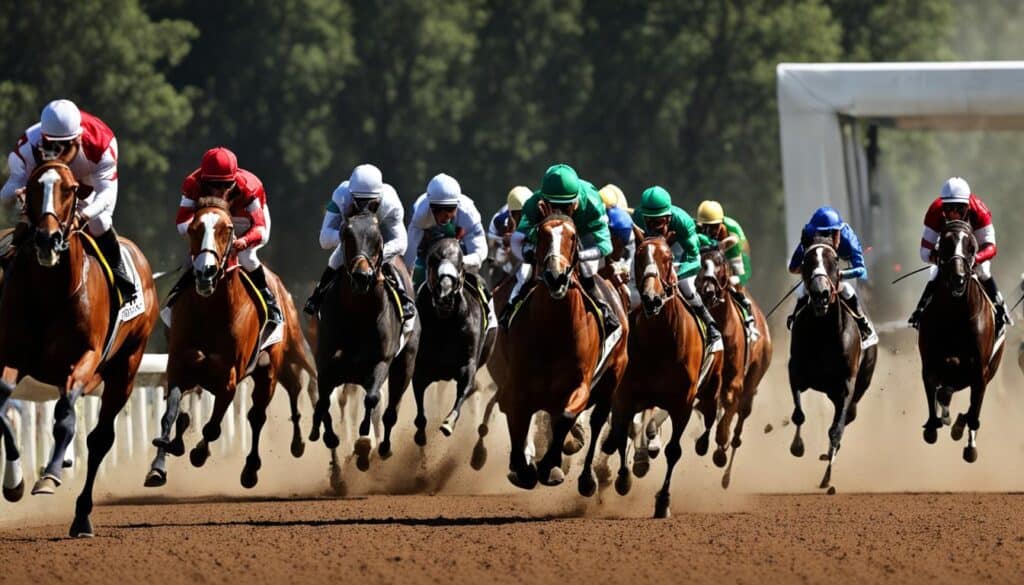
When it comes to horse racing, there are four main types of races that showcase the speed, agility, and endurance of these magnificent animals. Each type of race offers a unique experience for both spectators and bettors.
The first type of race is flat racing, which is the most common form of horse racing. In flat racing, horses compete over a level course without any obstacles. This type of race is all about speed and is often seen in events such as the Kentucky Derby and Royal Ascot.
Another type of race is steeplechasing, which adds an element of excitement as horses are required to jump over fences during the race. This thrilling form of racing tests both the horse’s speed and jumping ability. Steeplechase events like the Grand National in the United Kingdom attract a large audience.
Next, we have harness racing, where horses pull a two-wheeled cart called a sulky or chariot. This type of racing is often associated with trotters and pacers and requires skillful coordination between the horse and the driver. Harness racing is popular in countries like the United States, Canada, and Australia.
Finally, there is endurance racing, which tests the stamina and endurance of horses over long distances. These races can range from 50 to 100 miles or even longer. Endurance racing showcases the horse’s ability to maintain its pace and complete the race, often in challenging terrains. The Tevis Cup in the United States is a well-known endurance race.
In summary, the different types of horse races provide a variety of experiences for enthusiasts and bettors alike. Whether you prefer the speed of flat racing, the thrill of steeplechasing, the skillful coordination of harness racing, or the endurance test of endurance racing, there is a race for everyone to enjoy.
What Are the Most Common Types of Horse Racing Breeds?
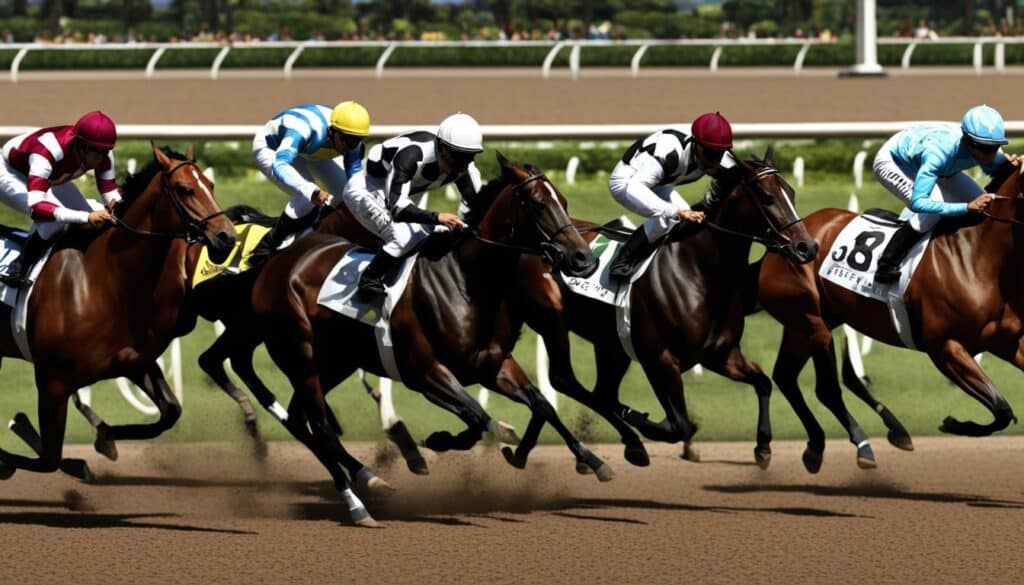
While there are over 350 horse breeds, only a select few are used in horse racing. The most popular racehorse breeds include the Arabian, Thoroughbred, American Quarter Horse, Standardbred, and Paint Horse. These breeds possess the qualities of strength, speed, and endurance necessary for competitive racing.
When it comes to horse racing, the breed of the horse plays a significant role in determining its performance on the track. Different horse breeds possess different characteristics and excel in different types of races. Let’s take a closer look at some of the most common horse racing breeds:
1. Arabian
The Arabian horse breed is known for its elegance, agility, and endurance. Originating from the Arabian Peninsula, these horses have a distinctive head shape and high tail carriage. Arabians excel in long-distance races, thanks to their ability to sustain a fast pace over extended periods.
2. Thoroughbred
The Thoroughbred breed is synonymous with horse racing. These horses are bred for speed and athleticism, making them the ideal choice for flat racing. Thoroughbreds are known for their speed, enabling them to achieve remarkable acceleration and maintain high speeds over short distances.
3. American Quarter Horse
The American Quarter Horse breed is renowned for its incredible burst of speed and agility. These horses can reach top speeds within a quarter of a mile, excelling in short-distance sprints. Their compact build and muscular hindquarters give them the power and quickness necessary for quick bursts of acceleration.
4. Standardbred
The Standardbred breed is primarily used in harness racing, where horses pull a two-wheeled cart called a sulky. Standardbred horses are known for their stamina and endurance, as they need to maintain a consistent pace over longer distances. They have a calm temperament and smooth gait, making them ideal for harness racing.
5. Paint Horse
The Paint Horse breed is known for its striking coat patterns, combining white and other colors. While Paint Horses are versatile and used in various disciplines, they have also made their mark in horse racing. These horses possess speed and athleticism, enabling them to compete in both flat and obstacle races.
These are just a few examples of the horse breeds commonly seen in the world of horse racing. Each breed brings its unique strengths and characteristics to the track, making horse racing an exciting and diverse sport.
Horse Betting 101: The Basics of Horse Betting
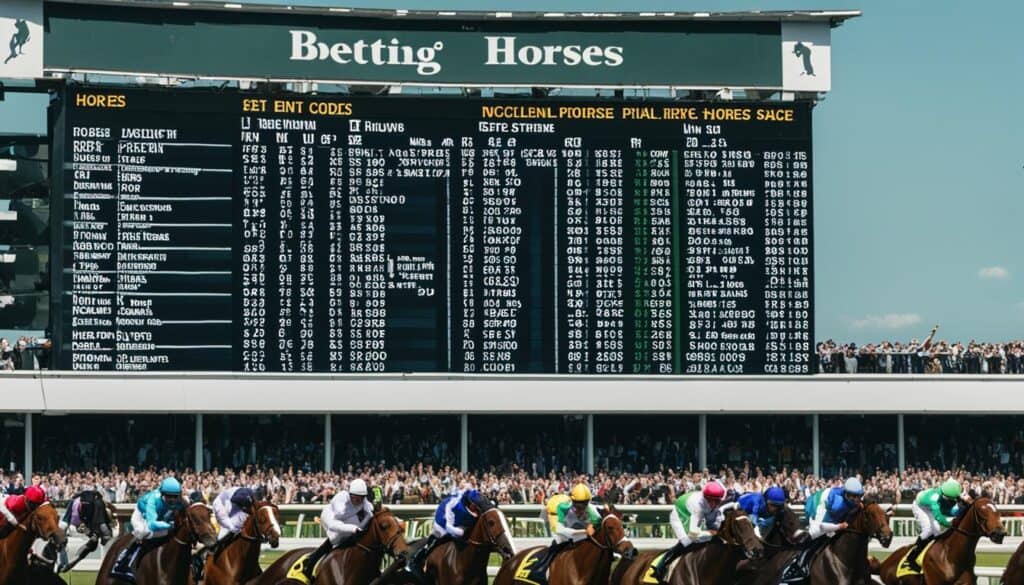
Horse racing betting is an integral part of the excitement that surrounds horse races. Whether you’re a seasoned bettor or a beginner looking to get started, understanding the basics of horse betting is essential. By familiarizing yourself with different types of bets and learning how to analyze the odds, you can make informed decisions and potentially win payouts.
There are various types of bets in horse racing, each with its own intricacies. The most straightforward bet is a win bet, where you wager on a horse to win the race. If your chosen horse finishes first, you collect your winnings. A place bet allows you to bet on a horse to finish in either first or second place. If your horse lands in either position, you win the bet. For those looking for a more conservative option, a show bet allows you to bet on a horse to finish in the top three positions.
When placing a bet, it’s crucial to consider the odds. The odds reflect the chances of a particular horse winning the race. You can often find these odds displayed as fractions or decimals. For example, if a horse has odds of 3/1, it means you would win $3 for every $1 you bet if the horse wins.
Before placing your bet, take the time to analyze factors such as the horse’s form, the jockey’s performance, and the track conditions. Form guides provide valuable information about a horse’s previous races and performance. Additionally, track conditions, such as the firmness of the ground, can greatly impact a horse’s performance.
Horse betting is an art that combines skill, knowledge, and a bit of luck. It’s important to approach it with a strategic mindset and set a budget for yourself. Only bet what you can afford to lose and remember that the thrill of the race goes beyond monetary gains.
To improve your understanding of horse betting, consider reading books, attending races, and engaging with experienced bettors. Learning from others can provide insights and strategies that may enhance your betting experience.
Remember, horse racing is an exhilarating sport, and betting on it adds an extra layer of excitement. By familiarizing yourself with the basics of horse betting and developing your betting strategies, you can immerse yourself in the thrill of the race and potentially walk away with a winning bet.
Exploring the Thrill and Excitement of Horse Racing
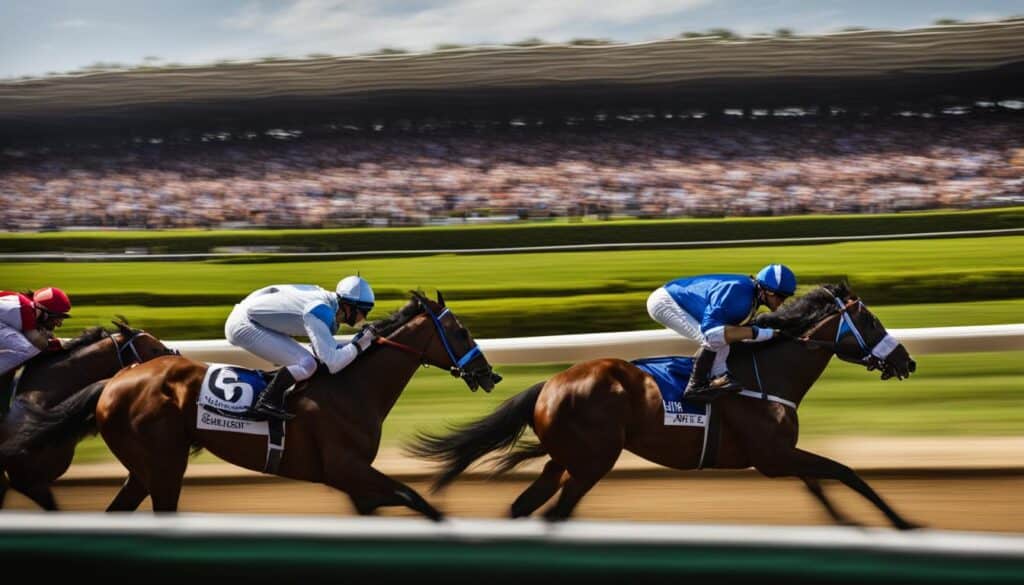
Horse racing is a thrilling and exciting sport that captivates audiences. The adrenaline-pumping action, the thundering hooves, and the close finishes make it a spectacle that appeals to horse racing enthusiasts worldwide.
Attending live races is an experience like no other. The atmosphere is electric as spectators gather to witness the speed, agility, and endurance of these magnificent creatures. As the race begins, the crowd roars with anticipation, cheering for their favorite horses and jockeys.
But it doesn’t stop there. Betting on races adds another layer of excitement and anticipation. Horse racing enthusiasts carefully study the form guides, analyze the odds, and make calculated decisions on which horses to place their bets. Every twist and turn of the race becomes a heart-pounding moment as bettors eagerly watch to see if their chosen horse will cross the finish line first.
For those who can’t make it to the track, online resources and replays provide a means to explore the strategies and intricacies of horse racing. Players can dive into in-depth analysis, watch race replays, and learn from experts to enhance their understanding of the sport.
The image above showcases the intensity and action of a horse race, capturing the essence of the sport that draws in horse racing enthusiasts and spectators alike.
The Social Aspect of Going to a Horse Race
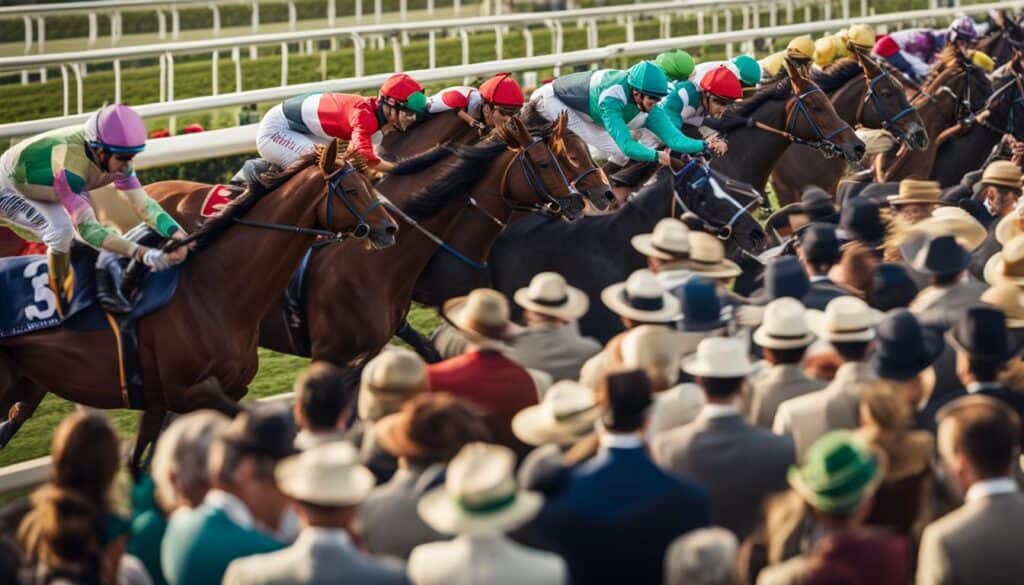
Attending a horse race is more than just watching the thrilling races; it’s also about embracing the social experience. Horse racing events bring together people from various backgrounds, offering opportunities to connect, network, and create lasting relationships with like-minded individuals.
The ambiance of a horse race encourages attendees to dress up in their finest attire, adding an element of elegance and sophistication to the event. It’s a chance to showcase personal style and enjoy the festivities with friends and family.
As spectators gather to watch the races, the excitement and anticipation create a shared sense of camaraderie. Whether it’s placing friendly bets or cheering for their favorite horses, the engaging atmosphere fosters a sense of community among attendees.
“The social aspect of going to a horse race is unparalleled. It’s an opportunity to connect with others who share a passion for the sport and enjoy a day filled with excitement and fun.”
In addition to the race itself, horse racing events often offer a variety of entertainment options, such as live music performances, food and drink stalls, and even fashion shows. These additional activities provide a vibrant backdrop for socializing and enjoying the overall experience.
For those attending horse racing events regularly, it’s common to form friendships and connections with fellow enthusiasts. The shared love for the sport creates a bond that goes beyond the racetrack, leading to new friendships and networking opportunities.
The social aspect of going to a horse race adds an extra layer of enjoyment to an already thrilling experience. It allows attendees to immerse themselves in a vibrant community, connect with others, and create cherished memories that extend far beyond the race itself.
The Cultural Significance of Horse Racing
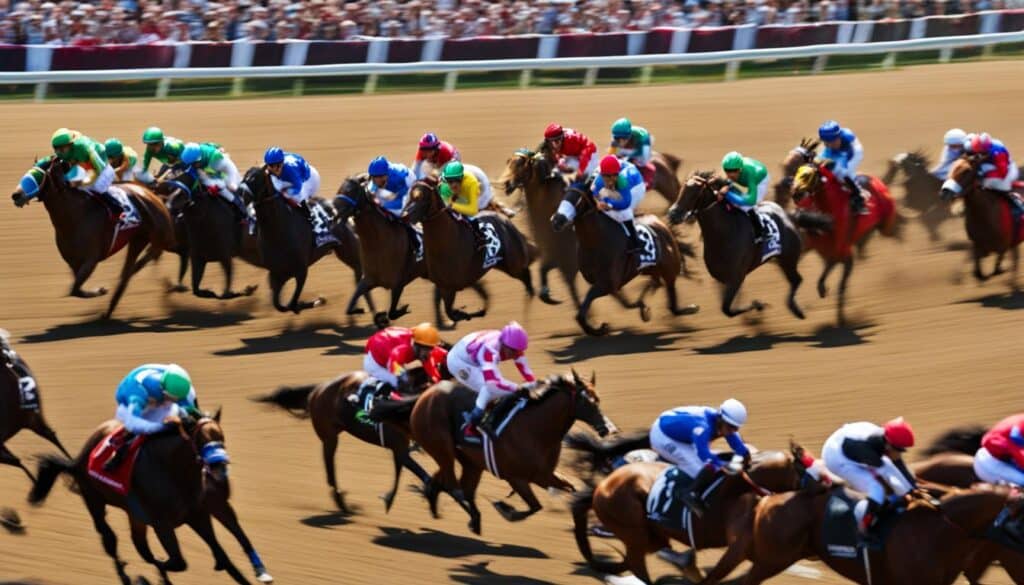
Horse racing is deeply rooted in human culture, spanning back centuries and symbolizing wealth and power. It holds a prominent place as both a form of entertainment and a source of national pride. Furthermore, the sport transcends borders, with countries from around the world participating in prestigious international competitions. These events showcase skill, determination, and the bond between horses and their riders, capturing the attention of millions worldwide.
The Global Spectacle of International Competitions
International horse racing competitions are a testament to the cultural significance and widespread appeal of the sport. Iconic races such as the Kentucky Derby in the United States, the Royal Ascot in the United Kingdom, and the Prix de l’Arc de Triomphe in France attract top horses, jockeys, trainers, and enthusiasts from across the globe. These events, steeped in tradition and prestige, showcase the highest level of horseracing excellence and serve as a platform for cultural exchange and friendly competition between nations.
Supporting Livelihoods and Communities
Horse racing is not only a thrilling spectacle but also a vital industry that supports the livelihoods of many individuals involved. Jockeys, trainers, breeders, grooms, and stable hands all contribute to the success of the racing industry. Beyond the individuals directly involved in racing, the sport also stimulates local economies through tourism, hospitality, and the sale of goods and services related to horse racing events.
“Horse racing is not just a sport; it’s a way of life. The love and dedication that goes into training these magnificent animals is admirable. Racing provides a platform for talented individuals to showcase their skills and fulfill their dreams.”
– John Smith, Horse Trainer
Horse racing’s cultural significance extends beyond the racetrack, woven into the fabric of society and influencing art, literature, fashion, and even language. Icons of horse racing, both human and equine, have become legendary and left an indelible mark on popular culture, further cementing the sport’s lasting impact.
As horse racing continues to evolve and captivate audiences worldwide, its cultural significance remains undeniable. It transcends boundaries, unites nations, and showcases the unparalleled connection between humans and horses. Whether attending a local race or cheering on international competitions, horse racing offers a unique blend of history, tradition, and sheer excitement.
Strategies for Successful Horse Racing Betting

Successful horse racing betting entails more than just luck; it requires careful analysis and strategic thinking. By utilizing effective strategies, you can increase your chances of making successful bets and maximizing your potential returns.
One crucial aspect of horse racing betting is analyzing form guides. Form guides provide detailed information about a horse’s past performances, including its recent races, finishes, and rankings. Studying form guides allows you to assess a horse’s consistency, form, and suitability for specific race conditions.
Another factor to consider is track conditions. Tracks can vary in surface type (dirt, turf, synthetic), condition (fast, wet, muddy), and configuration (oval, straight, undulating). Understanding how horses perform on different track surfaces and in various weather conditions can help you make informed betting decisions.
Moreover, it’s essential to evaluate jockey and trainer statistics. Experienced jockeys and successful trainers can significantly influence a horse’s performance. Analyzing their track records, winning percentages, and reputation within the racing industry can provide valuable insights into a horse’s chances of success.
To develop a sound betting strategy, consider a combination of these factors and establish a systematic approach. Keep track of your bets, analyze their outcomes, and identify patterns to refine your strategy over time.
Remember, horse racing betting is not solely dependent on individual factors but is a complex combination of various variables. It requires continuous learning, adaptability, and the willingness to adjust your strategy based on new information and results.
Key Strategies for Successful Horse Racing Betting:
- Analyze form guides to assess a horse’s performance and suitability.
- Consider track conditions, including surface type and weather.
- Evaluate jockey and trainer statistics to gauge their influence.
- Develop a systematic approach and refine your strategy over time.
“Successful horse racing betting requires a combination of knowledge, analysis, and a well-executed strategy.” – Expert Horse Racing Bettor
The Role of Bookmakers in Horse Racing Betting
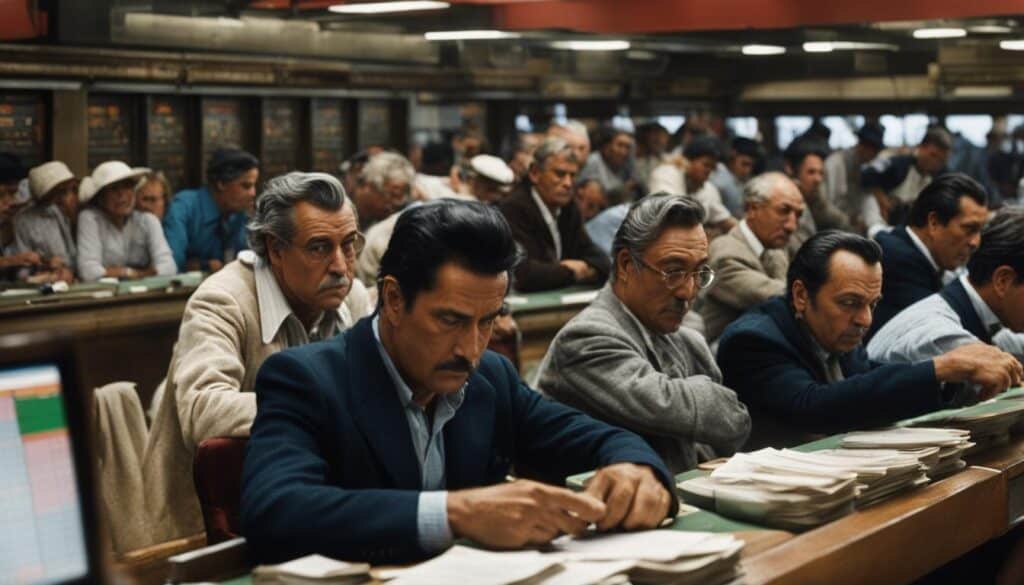
Bookmakers play a vital role in the world of horse racing betting. As the middlemen between bettors and the racing events, they provide the platforms and services necessary to place bets on horse races. Their expertise in setting the odds and managing the betting process ensures fair play and an exciting experience for all.
One of the key factors to consider when choosing a bookmaker is the competitiveness of the odds they offer. Bookmakers with better odds can significantly increase your potential winnings, so it’s important to compare different bookmakers to find the best value for your bets.
The user interface of the bookmaker’s platform is also crucial. A user-friendly interface makes it easier to navigate through the available races, place bets, and manage your account. Look for bookmakers that have intuitive platforms that provide a seamless and enjoyable betting experience.
Another important consideration is the payout speed. When you win a bet, you want to receive your winnings as quickly as possible. Look for bookmakers that prioritize fast and reliable payouts, ensuring you can access your funds without delay.
To make informed decisions when choosing a bookmaker, it can be helpful to read bookmaker reviews. These reviews provide insights into the reputation, reliability, and overall user experience of different bookmakers. By considering the experiences of other bettors, you can gain valuable information to guide your bookmaker selection process.
Choosing the right bookmaker is essential for a successful horse racing betting experience. By evaluating factors such as competitiveness of odds, user interface, payout speed, and consulting bookmaker reviews, you can make an informed decision that optimizes your chances of enjoying and profiting from horse racing betting.
Live Betting in Horse Racing
Live betting is revolutionizing the way we experience horse racing. It adds a whole new level of excitement and engagement to the sport, allowing bettors to place wagers as the race is happening.
With live betting, you have the advantage of real-time information at your fingertips. As the race unfolds, you can adjust your bets based on the performance of the horses, jockeys, and track conditions. This dynamic and interactive betting experience enhances the thrill of horse racing and can potentially lead to larger payouts.
Many bookmakers now offer live betting options for horse racing, allowing you to immerse yourself in the action. By taking advantage of these in-play wagers, you can stay involved in every moment of the race and make more informed betting decisions.
The Benefits of Live Betting in Horse Racing
- Real-time information: Live betting gives you access to up-to-date information on the race, helping you make more accurate predictions.
- Adjustable bets: With live betting, you can modify your wagers as the race progresses, maximizing your potential returns.
- Enhanced excitement: Experiencing the race in real-time and being able to react instantly to the action brings an added level of thrill and excitement.
- Improved strategy: With live betting, you can analyze the race dynamics and make strategic bets based on how the race is unfolding.
So, if you’re looking to take your horse racing betting to the next level, live betting is the way to go. Immerse yourself in the excitement of in-play wagers and join the action as it happens.
Frequently Asked Questions (FAQs) About Horse Racing Betting
Here are some frequently asked questions about horse racing betting:
-
How do I choose the right bookmaker for horse racing betting?
When choosing a bookmaker for horse racing betting, consider factors such as the bookmaker’s reputation, the competitiveness of their odds, the variety of betting markets they offer, and the user-friendliness of their platform. Conducting research and reading reviews can help you make an informed decision.
-
Can I place live bets on horse races?
Yes, many bookmakers offer live betting options for horse races. Live betting allows you to place bets while the race is happening, giving you the opportunity to assess the race conditions and adjust your bets accordingly. It adds an extra level of excitement and can be a strategic way to maximize your chances of winning.
-
Can I bet on underdog horses in horse racing?
Yes, you can bet on underdog horses in horse racing. Underdogs often have higher odds, which means greater potential returns if they win. However, it is essential to thoroughly analyze the horse’s form, track conditions, jockey and trainer statistics, and consider any other relevant factors before placing your bet.
-
How can I maximize my potential returns in horse racing betting?
To maximize your potential returns in horse racing betting, it is crucial to develop a sound betting strategy. This strategy may involve analyzing form guides, considering track conditions, studying jockey and trainer statistics, and comparing odds from different bookmakers through odds comparison tools. By conducting thorough research and making informed decisions, you can increase your chances of placing successful bets and maximizing your returns.
Remember, when participating in horse racing betting, it is important to gamble responsibly and set a budget for your betting activities. Good luck!
Conclusion
Horse racing and horse racing betting offer an exhilarating experience where each bet becomes a part of a thrilling story. Whether you are a passionate racing enthusiast or a casual bettor, understanding the basics of horse racing is essential for making informed decisions and maximizing your enjoyment.
Exploring the different types of races, from flat racing to steeplechasing, opens up a world of excitement and variety. Each race brings its own unique challenges and opportunities to back a winning horse. Developing strategies based on analyzing form guides, considering track conditions, and studying jockey and trainer statistics can give you an edge in the world of horse racing betting.
When it comes to placing your bets, choosing the right bookmaker is crucial. Look for bookmakers who offer competitive odds, user-friendly platforms, and fast payouts. Additionally, consider live betting options, which allow you to immerse yourself in the race and adjust your wagers in real time.
Horse racing and horse racing betting are not just hobbies but captivating adventures waiting to unfold. By embracing the thrill of the race and applying your knowledge and strategies, you can be part of the excitement and potentially experience the satisfaction of a winning bet. So, saddle up, analyze the odds, and get ready to be a part of the thrilling world of horse racing.
FAQ
How do I choose the right bookmaker for horse racing betting?
Choosing the right bookmaker for horse racing betting involves considering factors such as the competitiveness of odds, user interface, and payout speed. It is important to read bookmaker reviews and compare different options to make an informed decision.
Can I place live bets on horse races?
Yes, live betting on horse races is possible. Some bookmakers offer live betting options, allowing bettors to place wagers as the race is happening. This provides bettors with the opportunity to take advantage of real-time information and adjust their bets accordingly.
Can I bet on underdog horses in horse racing?
Yes, you can bet on underdog horses in horse racing. However, it is important to assess the horse’s form, track conditions, jockey and trainer statistics, and other relevant factors before placing your bet. Betting on underdogs can sometimes yield higher payouts, but it is crucial to make well-informed decisions.
How can I maximize my potential returns in horse racing betting?
To maximize your potential returns in horse racing betting, it is important to develop a sound strategy. This involves analyzing form guides, understanding track conditions, considering jockey and trainer statistics, and making well-informed bets. It is also essential to compare odds from different bookmakers to ensure you are getting the best possible value for your bets.
 Online Gaming Circuit
Online Gaming Circuit
